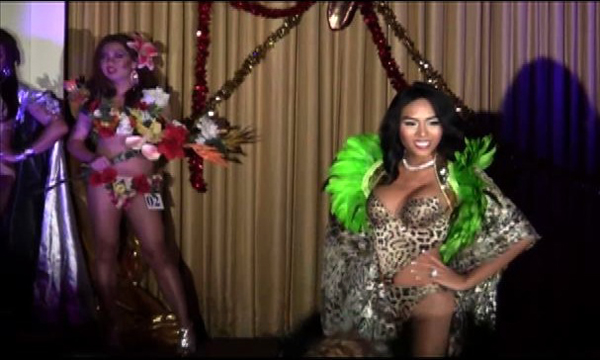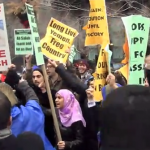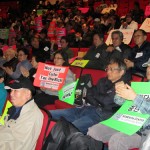
A transgender woman participating in the swimsuit competition at Miss AsiaNYC, a transgender beauty pageant at the Lovin' Life Learning Center in December, 2010. (Photo: Larry Tung)
New York – Pitchadapha Phasi always liked the glamor on stage. Having worked as a cabaret dancer in her native Thailand, she yearned for more opportunities to pursue her dream of becoming a model, and she saw her future overseas.
Deciding between London, Sydney, and New York, Phasi ultimately chose New York in the belief the city would offer more modeling work. And there was another reason too: New York is home to Miss AsiaNYC, a beauty pageant exclusively for transgender Asian women.
Arriving in New York in November 2010 on a student visa to study English, she immediately signed up for the pageant. One of her goals, she said, was to give the world a piece of her mind.
“To show my beauty, to show my transgender opinions to the people who never know about my world, to show up and let them know about my mind,” said Phasi, 23, who placed fourth in the 2009 Miss Tiffany Universe pageant in Thailand.
Phasi was one of 10 participants in the second annual Miss AsiaNYC pageant in December 2010. The event’s organizer, Michelle Manangan, is an immigrant from the Philippines who is also a transgender woman. The pageant’s goal is to create awareness and establish a supportive community for transgender Asian women in New York, and to reveal just how profoundly the members of this group are on the margins of society. She said Asians are under-represented in transgender beauty pageants.
“I feel like being a transgender, it’s so marginalized as it is in the LGBT community,” said Manangan, who organized beauty pageants in San Francisco before moving to New York. “Other than being called ‘Lady boys’ and other derogatory comments, we are special, we can come up with this [event].”
Watch footage from the pageant:
The Pageant
About 200 people attended the pageant, which was held in the Grand Ballroom at the Lovin’ Life Center in midtown Manhattan. It was primarily funded by private donations from the organizers’ friends. Manangan said she is trying to provide a stage for transgender Asian women to showcase their individuality and beauty.
“Hopefully in the years to come, it will be a community, a service,” she said.
The 10 participants represented different countries in Asia. The majority of the contestants were of Filipino descent, but others came from China, Indonesia, Guam, and Thailand.
“We want to represent the whole Asian community. Hopefully next year, other Asian girls would come out,” she said.
As for her home country’s passion for beauty pageants, Manangan offers a simple explanation: “We just appreciate beauty, and we love the limelight!”
The pageant featured competitions in national costume, swimsuits and evening gowns. The highlight of the event was the question and answer portion where contestants tackled some politically relevant topics.
Speaking of the “Don’t Ask, Don’t Tell” policy for gays in the military, Miss Thailand said serving in the Thai military made her a stronger person.
“Military gives me strength, give me powerful, give me smart, give me everything human body could practice, like body and mind, and that was very great, great for me.”
Miss Guam was asked about whether sex reassignment surgery should be included in national health care reform. Her answer was a firm yes.
“It’s what we deal with every day. But it shouldn’t be taken lightly…It is our right as a U.S. citizen, and as a person,” she said.
On marriage equality, Miss Indonesia said it should be extended to transgender people as well as gays and lesbians because “basic human love should be available to everyone.”
“I think pageants like these are an outlet for transgendered women who want to display their femininity and have it validated in some social context,” said Pauline Park, a transgender woman who co-founded the New York Association for Transgender Rights Advocacy. “It serves a good social function.”
But Park is also concerned that it might reinforce traditional stereotypes of femininity. While the contestants got to speak their mind, the pageant’s main focus was on physical appearance.
“After all, the emphasis on these pageants is the display of feminine beauty and youth. They do reflect a certain degree of looksism and very limited construction of what femininity is or can be,” said Park.
“What’s unfortunate is that it is one of the few outlets for transgendered women,” Park said. “I would like to see a wide range of activities that engage transgendered Asian women intellectually and politically,” she added.
Challenges for Transgender Asian Women
Transgender Asian women are not excluded from the traditional challenges facing new immigrants, like citizenship status, health care and language access.
“Some transgendered Asian women — especially those who are undocumented — are forced into sex work and face heightened risk of HIV infection and other sexually transmitted diseases,” said Park. “Many transgendered people lack health insurance and or full access to quality health care and are reluctant to approach social service providers in their ethnic communities for fear of discrimination or being ‘outed.’”
Park said one of the biggest challenges for transgender Asians is gaining acceptance from their families.
“Christian churches in the Korean American community tend to be socially conservative and are often homophobic and transgenderphobic. The Roman Catholic Church is also a central institution in the Filipino community, with implications for transgendered Filipinos,” Park said.
And the winner is…
Back on the stage, the contestants – dressed in elaborate gowns – sashayed to dance music. At the end of the evening, Phasi, Miss Thailand, was crowned Miss Asia NYC. Her all-embracing message was not so different from those heard at the culminating moment of more traditional pageants.
“You have to respect everyone, even different genders, different color of skin, different color of thinking. They have own way, they have own mind to think. So don’t judge covers of the books, because you never know inside of your heart,” Phasi said, flashing a beautiful smile.
Larry Tung is a Feet in Two Worlds LGBT reporting fellow. His work, and the work of other Fi2W fellows, is supported by the New York Community Trust and the John S. and James L. Knight Foundation with additional support from the Mertz Gilmore Foundation.




